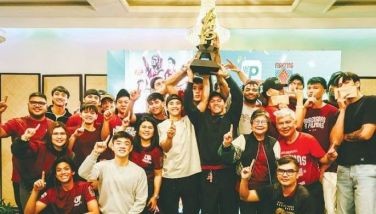Aquaculture biotechnology complex to rise in Iloilo
April 14, 2002 | 12:00am
A biotechnology laboratory will soon rise in the seaside Iloilo town of Tigbauan situated 24 kilometers west of Iloilo City.
The establishment of the Laboratory for Advanced Aquaculture Technologies is a joint initiative of the Department of Agriculture (DA) and the government-hosted Southeast Asian Fisheries Development Center Aquaculture Department (SEAFDEC AQD).
It was approved by the National Economic and Development Authority (NEDA) as a bilateral project between the Philippine and Japanese governments for funding under the Japanese Grant Aid for Fisheries.
A document subsequently signed by Vice President and Foreign Affairs Secretary Teofisto Guingona Jr. and Japanese ambassador to the Philippines Yoshihisa Ara stipulated that Japan would private ¥895 million (P431 million) for the project.
The project will be implemented pursuant to the objectives of the Medium-Term Fisheries Management and Development thrust for the fisheries sector.
With DA as the project proponent and recipient of the facilities, the biotechnology laboratory will be operated by SEAFDEC AQD and the DA-Bureau of Fisheries and Aquatic Resources (BFAR).
The project will provide laboratory facilities for advanced aquaculture research in the country. The facilities will assist aquaculture technicians in their efforts toward looking for better ways of increasing aquaculture production without causing harmful effects on the environment.
The new laboratory facilities are expected to enable SEAFDEC AQD to develop more advanced aquaculture technologies, which will eventually be disseminated to the fishfarmers for adoption.
Recently, the cornerstone of the enclosed wet laboratory component of the biotechnology complex was laid. (Other components of the laboratory are Endocrinology and Genetics, Feed Technology, Algal Production, and Microbiology laboratories.)
Guests of honor during the cornerstone laying were Senate President Franklin Drilon and Ambassador Ara.
The guests included Agriculture Undersecretary Cesar Drilon Jr., Presidential Assistant for West Visayas Rene Villa, Iloilo Gov. Neil Tupas, Executive Director Myla Grace Macahilig of the Foreign Affairs Office of Financial Management, Department of Science and Technology-Region 6 Director Zinia Teruel, NEDA-Region 6 director Truman Cainget, Dean Romeo Fortes of the U.P. Visayas College of Fisheries and Ocean Sciences, Japanese embassy First Secretary Eiji Ueno and Second Secretary Hiromichi Sakuma, Drusela Ong of BFAR-Region 6 office, and Efrain Baldago of the Iloilo City mayor’s office.
In his welcome address, AQD chief Dr. Rolando R. Platon thanked the Japanese and Philippine governments for the establishment of the laboratory.
Ambassador Ara described the laboratory as "a symbol of friendship between the governments of Japan and the Philippines and hopefully face the challenges in aquaculture such as increasing fish production in the region."
For his part, Sen. Drilon expressed his gratitude to the Japanese government for fuding various infrastructure projects in Iloilo, including the soon-to-be-built International Airport in Sta. Barbara town and flood control facilities in Iloilo City.
The senator expressed the hope that with the establishment of the biotechnology laboratory, aquaculture production in the country would be considerably boosted.
Drilon also urged SEAFDEC AQD to focus its research activities on practical aquaculture applications. He further encouraged the department to intensify efforts to extend packaged technologies to fishfarmers.
The establishment of the Laboratory for Advanced Aquaculture Technologies is a joint initiative of the Department of Agriculture (DA) and the government-hosted Southeast Asian Fisheries Development Center Aquaculture Department (SEAFDEC AQD).
It was approved by the National Economic and Development Authority (NEDA) as a bilateral project between the Philippine and Japanese governments for funding under the Japanese Grant Aid for Fisheries.
A document subsequently signed by Vice President and Foreign Affairs Secretary Teofisto Guingona Jr. and Japanese ambassador to the Philippines Yoshihisa Ara stipulated that Japan would private ¥895 million (P431 million) for the project.
The project will be implemented pursuant to the objectives of the Medium-Term Fisheries Management and Development thrust for the fisheries sector.
With DA as the project proponent and recipient of the facilities, the biotechnology laboratory will be operated by SEAFDEC AQD and the DA-Bureau of Fisheries and Aquatic Resources (BFAR).
The project will provide laboratory facilities for advanced aquaculture research in the country. The facilities will assist aquaculture technicians in their efforts toward looking for better ways of increasing aquaculture production without causing harmful effects on the environment.
The new laboratory facilities are expected to enable SEAFDEC AQD to develop more advanced aquaculture technologies, which will eventually be disseminated to the fishfarmers for adoption.
Recently, the cornerstone of the enclosed wet laboratory component of the biotechnology complex was laid. (Other components of the laboratory are Endocrinology and Genetics, Feed Technology, Algal Production, and Microbiology laboratories.)
Guests of honor during the cornerstone laying were Senate President Franklin Drilon and Ambassador Ara.
The guests included Agriculture Undersecretary Cesar Drilon Jr., Presidential Assistant for West Visayas Rene Villa, Iloilo Gov. Neil Tupas, Executive Director Myla Grace Macahilig of the Foreign Affairs Office of Financial Management, Department of Science and Technology-Region 6 Director Zinia Teruel, NEDA-Region 6 director Truman Cainget, Dean Romeo Fortes of the U.P. Visayas College of Fisheries and Ocean Sciences, Japanese embassy First Secretary Eiji Ueno and Second Secretary Hiromichi Sakuma, Drusela Ong of BFAR-Region 6 office, and Efrain Baldago of the Iloilo City mayor’s office.
In his welcome address, AQD chief Dr. Rolando R. Platon thanked the Japanese and Philippine governments for the establishment of the laboratory.
Ambassador Ara described the laboratory as "a symbol of friendship between the governments of Japan and the Philippines and hopefully face the challenges in aquaculture such as increasing fish production in the region."
For his part, Sen. Drilon expressed his gratitude to the Japanese government for fuding various infrastructure projects in Iloilo, including the soon-to-be-built International Airport in Sta. Barbara town and flood control facilities in Iloilo City.
The senator expressed the hope that with the establishment of the biotechnology laboratory, aquaculture production in the country would be considerably boosted.
Drilon also urged SEAFDEC AQD to focus its research activities on practical aquaculture applications. He further encouraged the department to intensify efforts to extend packaged technologies to fishfarmers.
BrandSpace Articles
<
>
- Latest
Latest
Latest
April 10, 2024 - 5:12pm
By Ian Laqui | April 10, 2024 - 5:12pm
March 4, 2024 - 3:32pm
By Ian Laqui | March 4, 2024 - 3:32pm
March 4, 2024 - 2:12pm
By Kristine Daguno-Bersamina | March 4, 2024 - 2:12pm
February 17, 2024 - 2:31pm
February 17, 2024 - 2:31pm
February 13, 2024 - 7:24pm
By Gaea Katreena Cabico | February 13, 2024 - 7:24pm
Recommended




























